WASHINGTON, DC
December 3, 2019
STRANGER: Rayceen Pendarvis
LOCATION: Sala Thai, 2300 Washington Place NE, Washington, DC
THEME: Dinner with a District activist, mentor, emcee and variety show host
“I am the original gender blender,” says Rayceen Pendarvis, winking at me mischievously while adjusting a fire truck-red beret and flicking long gray braids over one shoulder. “You can’t offend me if you call me Mr. Rayceen or Mrs. Rayceen, just don’t call me bitch the wrong way.”
And then Rayceen laughs, starting low and subtle like a naughty child trying to stifle a laugh in class, building to a body-shaking bellow. But there’s truth to learn through the humor. “People ask me how I identify, are you male, are you female? I tell them I’m a human being, I’m a two-spirit person. I embrace my feminine side, my masculine side. I don’t get caught up in labels. I’m a human being walking in this human experience called life.”
The human being sitting across from me has done a lot of walking in their native Washington, DC, from growing up amid the freedom marches and riots of the 1960s through to representing the community as an Advisory Neighborhood Commissioner, and from hosting a popular local variety show that regularly draws big name guests through to working as an activist and mentor on issues including transgender rights, tackling HIV, confronting gentrification, and more.
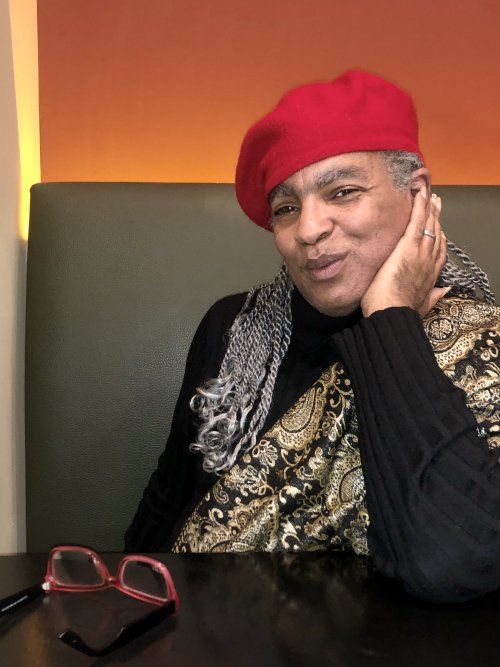
Even today Rayceen has a packed schedule; in the morning working as a nail salon technician in Dupont Circle and then overseeing the launch of a new YouTube series, Tell Rayceen, featuring one-on-one conversations with notable local artists, politicians, advocates, and others. And now a dinner interview with me at Sala Thai in the city’s Brentwood neighborhood.
Tell Rayceen follows The Ask Rayceen Show, a free monthly variety show launched in 2012 and since 2017 hosted at the Human Rights Campaign’s headquarters in DC featuring live music, interviews, panel discussions, games, comedy and more, all with Rayceen as the charismatic emcee. The show has drawn major local guests including celebrities and members representing each of the eight wards of DC’s council over the years.
The new video series aims to be a more intimate one-on-one talk with people. “Just all walks of life, listening to them and giving them a platform to talk about whatever they’re doing.”
Rayceen credits the staff behind The Ask Rayceen Show for encouraging the idea of Tell Rayceen. “That’s the importance of having people believe in you and you believe in them and trusting the process and working together and growing my brand and building my brand, and understanding that there are people who have never seen Rayceen for whatever reason and when they get to experience little bits of me they will want more of me.”
What is the Rayceen experience? A pause. And then “liberating,” is the response. “I always use the term ‘free people free people,” I’m free in every point of my life. There’s a lot of people who can’t be free or folks who are late bloomers coming into who they are, so I think when people meet me it’s liberating, I believe that I create a safe space for everyone.”

Rayceen, recently profiled in Washington City Paper as “the freedom fighter,” has been creating safe spaces in the District for decades; whether it’s acting as a confessional for clients at the nail salon, mentoring youth, or reaching out to people who don’t approve of the LGBTQ community and trying to find common ground on other issues like helping the homeless.
“I do so many things in my community because it gives me so much joy and it fills my spirit,” says Rayceen, who tells me the newspaper came up with the title of freedom fighter, and then smiles about its implications. “I thought it was very powerful. When I think of freedom fighter I think of people like Harriet Tubman, Rosa Parks, Malcolm X, James Baldwin — those folks who went before me, who made it possible for me. But now that I am older there are people who will say, ‘Rayceen helped me get free,’ so yes, I guess I’m a freedom fighter.”
A major part of Rayceen’s work is mentoring, “taking the time to sit with young people and listen to them, not talk at them, because they’re the key to everything. When you’re young and finding your way you need a little guidance, and I want to help put them on the yellow brick road of life, because they can get sidetracked trying to see The Wizard. You don’t want them to get stuck in Oz, you want them to find their own way and help them however that might look. And mentorship is different for a lot of people; for some it’s education, for some it’s life skills, for some it’s spiritual guidance, for others it’s keeping them away from drugs and alcohol.”
The team for The Ask Rayceen Show and Tell Rayceen includes several people much younger than the host, and I learn that’s by design. “I tell the young people we need you and you need us and we need each other. I have a right at the table too. Just cause I’m old I ain’t cold.”
The variety show launched as one of the many ways to achieve that mentoring and support, using the arts as a way to help people grow. “You have to feel as if people are supporting you to understand you can become anything you want, and that’s why I created The Ask Rayceen Show; art is healing, through poetry, through dance, through music.”
Photos of The Ask Rayceen Show are posted to the event’s Facebook page, and Rayceen says the online presence generates feedback from viewers in DC, across the United States and as far away as Russia and China, including LGBT youth in those countries seeking advice. “I’m amazed at the messages I get and the people who have found me.”
Rayceen, who has five biological children, says the decades of mentoring work with the city’s youth means: “I’m a father of five and mother to many.”
That belief in the broadest possible definition of family stems in part from Rayceen’s ongoing involvement in the ballroom scene. Rayceen was one of the founding members of the House of Pendavis, which was founded in 1979 and featured in the ballroom documentary movie Paris Is Burning. Houses have “mothers” and “fathers” giving guidance to their “children,” and Rayceen’s activism started soon after joining the house in the 1980s (Rayceen adopted Pendavis as a surname, but added an “r” so spells it Pendarvis).
“Avis Pendavis was an amazing woman who spoke 10 different languages and had a wealth of knowledge and history. She was an amazing beam of light. I could go to her and talk to her about anything,” says Rayceen. “And what she instilled in our community was the importance of education — so you can walk a ball, you can win, but can you get a job, can you get a diploma? What do you want to do with your life after the ball ends? She always pushed our community to be better, and people like that help fuel me” with advocacy and mentoring.
We pause the conversation as our waitress arrives with the first course at Sala Thai, where Rayceen and I are nestled in a booth toward the back of the restaurant. It’s a brightly lit venue with a simplistic design of black tables and chairs surrounded by white and orange walls and floor-to-ceiling windows. Rayceen lives down the street, and is a regular here.
Our starter is five generously sized house dumplings: steamed crabmeat, shrimp and minced pork wrapped in wonton skin served with vinaigrette soy sauce.
“It has a great kick,” says Rayceen, and I agree. The dumplings are delicious and gone quickly.

Sala Thai is a relatively new addition to a neighborhood that Rayceen has called home for decades, being born and raised in Washington. “In my early years I lived in Shaw right off 13th Street by ‘Black Broadway,’ which in its heyday was a wonderful wealthy neighborhood of proud black people who took pride in their community. You had doctors, lawyers, teachers — even being born in a time of segregation our cultures and our neighborhoods were proud and rich. Our parents shielded us from that sting of racism, but they felt it, and the choice they made was for it not to cause us to destroy us or to hate people just because they hated us.”
Rayceen says the city has evolved significantly over the years in a progressive direction from the March on Washington in 1963 to that decade’s riots, through to present day with its pride parades that seem to grow in size every year. “It’s amazing to live to see so many things, I’ve marched with a king and a queen. I’m really honored to say I’m here. I survived the peril of the AIDS epidemic, I came through unscathed through God’s grace and mercy, but I saw it take so many of my friends and it fueled me to honor their lives in activism.”
AIDS also took the life of the person that Rayceen credits with helping understand an evolving queer sexuality. “I think I always knew it, I fought it for a long time, but what a joy when I finally accepted it. I realized in high school. I was 12, there used to be this older queen — anyone that’s 18 years old seems old as hell to you at that age — who wore shorts and clogs and was very unapologetically gay, and we used to call him Miss Billy Matthews. He lived around the corner and every time he walked down the block I’d call him out,” says Rayceen, mimicking an eye roll and grunt of disgust. “I’d say, ‘Look at that sissy,’ and he would never say anything other than smile. Years later, as I came into who I was, I was hosting the very first black gay pride 30 years ago, and I saw him in the crowd. He waited for me to come off stage, and I walked over to him and I said, ‘I’m sorry,’ and he said, ‘It’s okay baby, I always knew, I was just waiting for you to find out who you were. And we hugged each other and saw each other for many more prides.”
Then one year things changed, and Billy showed up at pride looking frail. “When we embraced I knew that would be last time I saw him, I knew he was going through the illness,” says Rayceen. “He told me he was proud of the person I became and I told him he had a lot to do with that because he never ever chastised me when I attacked him, he always gave me love and kind words and helped me understand that what I saw in him was in me. And it’s people like him who taught me to be me and to given me the strength and courage to live my life.”

Rayceen’s life after high school led to the beauty industry and work as a nail technician that continues to this day. But for a while in the mid-1990s there was also a stint as a singer in a group, which involved spending many weekends in New York. “I was introduced to entertainment and a lot of celebrities, but I also saw the ugly side of showbusiness. I learned not to allow fame to consume you, don’t sell your soul for the sake of being a star.”
Although Rayceen was turned off by the business side of the music industry, the skills learned and contacts made by performing as a singer helped build the path toward a future role as an emcee. Initially the work was hosting fashion and music shows, which led to invites to present other, bigger events including variety shows. And it’s that experience that made it such a natural progression to ultimately hosting The Ask Rayceen Show many years later.
Guests including the members of the DC council feel “safe” on the show, able to engage and answer questions without fear of being attacked, Rayceen explains. “Creating that safe space for my guests is important for me, I want to make everyone feel welcome.”
Take a look at the first two videos for Tell Rayceen and you’ll see that same inviting spirit, and it’s a mentality Rayceen is also using for activist work on several issues.
I ask what’s the biggest issue facing DC that affects Rayceen’s advocacy, and this is the response: “Gentrification, it has a rippling effect and touches so many things. Our community leaders have to be involved, we know change is coming but we have the opportunity to help design what that change may look like when we are invited to the table. But we are not always invited to the table. Sometimes you’ve got to kick the door down. People need to feel as if they still belong in this city, but we’re pricing them out, and we have to find ways of helping them.”
Waving a hand as if to gesture across the entire city, Rayceen says, “I hate the fact that certain things don’t look the same anymore; we’re tearing down schools and churches and building condos instead of providing low-income housing. Instead of complaining about all of the homeless people that stand around Union Station where you live in million dollar condos, how can you help them? Don’t complain about them, find ways to help them get off the street.”
Rayceen also worked to help others during service as a member of the local Advisory Neighborhood Commission, handling issues like zoning and traffic collection. Rayceen recalls the opening a Home Depot in Brentwood and assuring the sex workers who made their living in the area that they’d be protected, as they feared the impact of the store’s arrival.
Another vital issue for Rayceen is violence against DC’s transgender community, with increasing reports of murders and assaults. “The sad thing is it happened many years ago too, folks just never reported it,” Rayceen says, adding that social media has helped to increase focus on the attacks. “Thousands of folks lost their lives due to hate crimes that we will never know about, but this time they know about them and are holding people accountable, and we’re changing people’s perceptions so they realize this could be your son or your daughter. I have to believe in that because it keeps me going, I am optimistic we can be better than the world around us.”
That positive outlook is inspired by the people Rayceen mentors. “Sometimes I get frustrated and worry about all the ills, but then I young person tells me they want to be a doctor or lawyer or teacher and change things because they met me and I pushed them to be better.”
While we’re talking, our main courses arrive, with Rayceen eating fried rice with chicken, onion, peas, carrot, tomato and scallion in yellow curry powder sauce.

“I always get this, it’s adorable,” Rayceen says with a smile.
I’m having the pad Thai: noodles sautéed with choice of meat, egg, bean sprout, scallion, red tofu and ground peanut.
A standard dish for a Thai restaurant but one that Sala Thai does incredibly well, all of the ingredients fresh and the portion more than generous.
Rayceen takes some time to pepper me with questions, and I learn why so many people must feel comfortable on The Ask Rayceen Show and Tell Rayceen. The person sitting across from me has a bright, inquisitive mind, has a playful, happy nature that’s quick with jokes, and projects sincerity and warmth. In just one hour with Rayceen my mood elevates significantly.
In addition to hosting interviews, Rayceen also continues to be involved in the ballroom scene and hosts a mini ball every April. “I’m now one of the elders of the House of Pendavis, Avis is mother emeritus and there are different mothers in different chapters in Los Angeles, Atlanta, London, Paris – it’s gone global and it’s so amazing. It’s still alive and well.”
Whether the people Rayceen mentors realize it or not, all of the “children” in the extended family are members of the House of Pendarvis. They’re all instilled with that same upbeat approach to life, something the house elder reiterates to me across the table.
“Everyone is welcome in my house,” says Rayceen. “Just be your authentic self, that is part of my freedom; not allowing anyone to box me in. It’s so important to understand the power of who you are. Are you butch enough? Are you femme enough? Are you gay enough? Are you too religious? Are you non-religious? I got to this point in my life where I know who I am, and that is a gift, that is a tool that I can use to enlighten others on their journeys.”
Rayceen’s many fans and students over the years both in the District and beyond would testify to that assistance, and it’s a legacy of which to be proud. “When all is said and done I think I can say I came, I mattered, and I cared, and that’s the most important thing.”
Loved reading about this dynamic person!
yx0r41